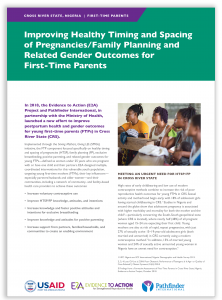You are Not Alone
By: Lauryn Dunkwu, Former Program Coordinator, Pathfinder NigeriaIn my country, the largest obstacle to providing better family planning for young people is fear. Although Nigeria’s youth are curious about contraceptive options, making them comfortable enough to visit health care facilities is an ongoing challenge. I grew up within this system.For the young people of my community, talking about family planning remains an important conversation that no one wants to have. And speaking up about contraceptive choice often puts them at risk for public condemnation. That’s why I care so much about my work with young people. I can try to remove some of the barriers to this conversation—starting with judgment. My name is Lauryn. Over the past year, I have observed many group discussions by young mothers through our program for first-time parents.* In Nigeria, 15% of married young women and 24% of sexually active unmarried young women in have an unmet need for contraception. Most of the young, first-time mothers in this program move from outside communities to live with their partners, which can be lonely and isolating—especially while learning to care for their newborns. In these peer group sessions, young mothers can share their thoughts and concerns about adjusting to major life changes in an unfamiliar environment with a group of young women in similar situations. This fosters a sense of solidarity and companionship that encourages them to voice questions about family planning and contraceptive choice that they were previously too afraid to ask.
Resources for first-time fathersWhen it comes to new parenthood, men need support systems too. That’s why our program also hosted separate small group sessions for the partners of these young mothers. The conversations we had focused on building healthy relationships by talking through problems and making decisions as a couple. One of the new fathers shared a story about his girlfriend, who had become withdrawn after giving birth and had difficulty bonding with their baby. After they each attended their first-time parent group sessions, she felt more comfortable telling him about her hardships, and he was able to better empathize with her situation. She, like many of the other mothers in the peer group, was having trouble making friends in her new community, and the discussions they had showed them how to address their issues together. Because they learned to share their thoughts and feelings, their relationship—with each other and with their child—improved. I believe everyone needs community, support, and accurate information to lead fulfilling reproductive lives. I am proud to wake up every day to work with Nigeria’s youth and for Nigeria’s youth—to make sure they have knowledge and self-confidence, and to help guide first-time parents through this critical time in their reproductive lives
SEE OUR RESULTSDiscover what we learned and the results we delivered, including a significant increase in voluntary use of modern contraceptive methods among first-time mothers and male partners in Nigeria. *** * In 2018, the Evidence to Action (E2A) Project and Pathfinder, in partnership with the Ministry of Health, launched a new effort to improve postpartum health and gender outcomes for young first-time parents in Cross River State, Nigeria. Implemented through the Saving Mothers, Giving Life Initiative, the first-time parent (FTP) component focused specifically on healthy timing and spacing of pregnancies, family planning, exclusive breastfeeding, positive parenting, and related gender outcomes for young FTPs—defined as women under 25 years who are pregnant with or have one child and their partners. |


